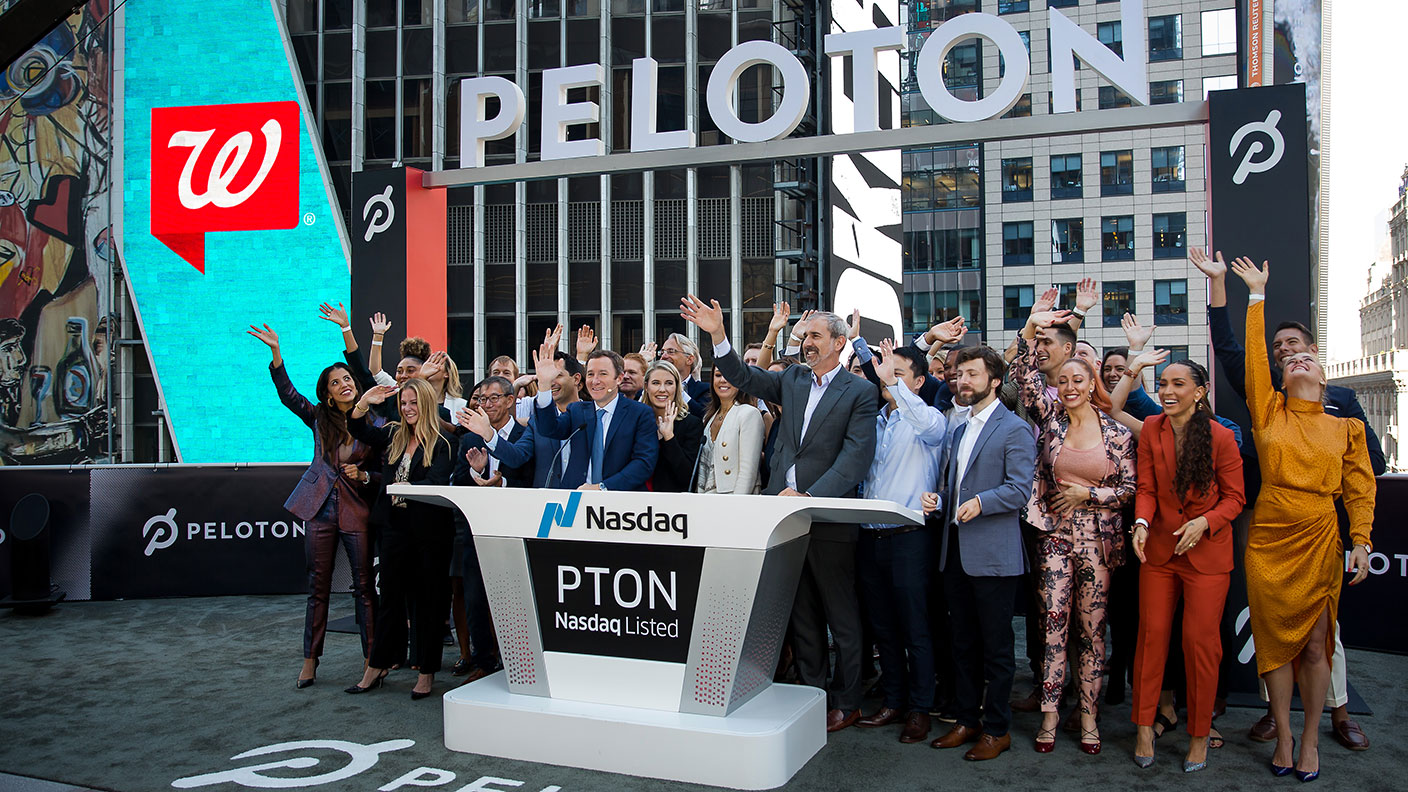Is it time to buy Patient Capital Trust?
Neil Woodford’s Patient Capital Trust has been taken over by asset manager Schroders. The share price has surged - but should you buy in? John Stepek looks at the trust’s prospects.

Get the latest financial news, insights and expert analysis from our award-winning MoneyWeek team, to help you understand what really matters when it comes to your finances.
You are now subscribed
Your newsletter sign-up was successful
Want to add more newsletters?

Twice daily
MoneyWeek
Get the latest financial news, insights and expert analysis from our award-winning MoneyWeek team, to help you understand what really matters when it comes to your finances.

Four times a week
Look After My Bills
Sign up to our free money-saving newsletter, filled with the latest news and expert advice to help you find the best tips and deals for managing your bills. Start saving today!

Quick thing before we start: if you're not already subscribing to MoneyWeek magazine, you can get your first 12 issues for £12, plus a free report on Brexit, all by signing up now. Don't miss it!
Things might be looking up for (some) Neil Woodford investors.
Schroders is taking over Woodford Patient Capital Trust. The trust will be renamed Schroder UK Public Private Trust. The share price surged yesterday as a result.
MoneyWeek
Subscribe to MoneyWeek today and get your first six magazine issues absolutely FREE

Sign up to Money Morning
Don't miss the latest investment and personal finances news, market analysis, plus money-saving tips with our free twice-daily newsletter
Don't miss the latest investment and personal finances news, market analysis, plus money-saving tips with our free twice-daily newsletter
Woodford had been set to run the trust for three months, but according to Morningstar, "Schroder is poised to take over the running of the trust by the end of the year."
So what happens now?
The future for Patient Capital
First things first you may not be surprised to hear that the (inadvertently) generous fee structure is going to change. Under Woodford, the management needed to deliver net asset value (NAV) growth of at least 10% a year before they became eligible to take a fee.
That never happened (although there was a 0.23% a year charge for annual expenses). So while Patient Capital investors have lost plenty of money (on paper, at least), most of that damage can't be blamed on fees.
Setting such an ambitious target for NAV growth presumably demonstrates the somewhat overstated sense of self-confidence Woodford had at the time. No one was going to take over the trust on the same terms, and so it has proved.
Schroders won't charge a fee for the first three months. But after that, the group will charge 1% a year on the first £600m of assets, and then 0.8% on anything above that.
There's going to be a performance fee too, although that does not kick in until 3 December, 2022. After that point, Schroders will take 15% "of any excess returns above a NAV per share of 77p". (At the moment, the NAV is 63.2p).
And then after that, there will be a 15% fee "of any performance above a hurdle of 10% of net assets a year, subject to a high watermark."
We don't like performance fees at MoneyWeek we feel that there are better ways to align managers' interests with those of investors. That said, if Patient Capital's NAV recovers to a point where investors actually believe that 77p is an accurate estimate, then Schroders will probably have earned the money.
More importantly, what does this mean for Patient Capital's prospects? Is it worth buying in?
The share price surged by almost a third on the news of Schroders' appointment. Yet despite this massive relief rally, the share price is still a good way below the 45p a share at which I said you shouldn't touch it with a ten-foot bargepole last month.
It's also still trading at a massive discount to its NAV of nearly 40%.
In other words, if Patient Capital Trust is genuinely worth buying, I don't think you've missed your opportunity. The question, of course, is this: is it?
Is Patient Capital worth buying now?
What do we know now that we didn't know this time last week?
The fact that Schroders is willing to take on Patient Capital suggests that it is not an entirely lost cause. And apparently Schroders aims to run it in line with the current plan to generate long-term capital growth by investing in both listed and unlisted, primarily UK-focused, companies.
So it's not yet being wound up. Therefore, unlike the open-ended fund, the risk of pressured, fire-sale assets is lower than it was before.
That said, we still don't know what the new management team is going to think when they get a proper chance to trawl through the portfolio.
As Alan Brierley of Investec points out, "Schroders will inherit a highly geared, highly illiquid and concentrated portfolio, predominantly consisting of venture capital investments we expect to see more gremlins before any unicorns."
There's also as Brierley alludes to the tricky question of gearing. The trust needs to sort out its debt levels to give it more room for manoeuvre. Arguably, that should be a bit easier to do now that there is more clarity on the fund's future, but it's still a challenge.
Overall, I'd say that the big change here is that Patient Capital has bought itself some time. That's very important.
The big reason that Woodford got into trouble in the first place is that the illiquidity of his portfolio meant that he had to make short-term decisions based on managing that exposure, rather than long-term decisions this investment style requires.
So getting some breathing space is a big plus. And if the Schroders handover goes relatively smoothly, then chances are that the main concern left will be the quality of the portfolio, rather than issues of running up against limits on leverage and unquoted holdings.
That means that if the underlying investments are genuinely decent, then they might just get the room they need to realise their potential. The question then, of course, becomes: do they have sufficient potential?
I can't answer that. Normally I'd say that a 40% discount to NAV was a wide enough margin of safety not to worry, but this is not a normal situation.
Long story short, I think that this has removed some of the uncertainty hovering over the fate of Patient Capital, and as a result, that does make it more appealing. I don't think it's a high-conviction bargain. And I'm not desperately tempted to invest myself.
That said, if you've been eyeing it up, then I think now could be the time to make a cautious initial investment. In more down to earth language, it's gone from being untouchable to "maybe worth a punt". That's about the best I feel I can say about it right now but that's a lot better than what I was saying a month ago.
Get the latest financial news, insights and expert analysis from our award-winning MoneyWeek team, to help you understand what really matters when it comes to your finances.

-
 How to navigate the inheritance tax paperwork maze in nine clear steps
How to navigate the inheritance tax paperwork maze in nine clear stepsFamilies who cope best with inheritance tax (IHT) paperwork are those who plan ahead, say experts. We look at all documents you need to gather, regardless of whether you have an IHT bill to pay.
-
 Should you get financial advice when organising care for an elderly relative?
Should you get financial advice when organising care for an elderly relative?A tiny proportion of over 45s get help planning elderly relatives’ care – but is financial advice worth the cost?
-
 Are UK house prices set to fall? It’s not so simple
Are UK house prices set to fall? It’s not so simpleAnalysis Figures suggest UK house prices are starting to slide, but we shouldn’t take these numbers at face value, explains Rupert Hargreaves.
-
 Tesco looks well-placed to ride out the cost of living crisis – investors take note
Tesco looks well-placed to ride out the cost of living crisis – investors take noteAnalysis Surging inflation is bad news for retailers. But supermarket giant Tesco looks better placed to cope than most, says Rupert Hargreaves.
-
 It may not look like it, but the UK housing market is cooling off
It may not look like it, but the UK housing market is cooling offAnalysis Recent house price statistics show UK house prices rising. But John Stepek explains why the market is in fact slowing down and what this means for you.
-
 Think the oil price is high now? You ain’t seen nothing yet
Think the oil price is high now? You ain’t seen nothing yetAnalysis The oil price has been on a tear in recent months. Dominic Frisby explains why oil in fact is still very cheap relative to other assets.
-
 What can markets tell us about the economy and geopolitics?
What can markets tell us about the economy and geopolitics?Sponsored Markets have remained resilient despite Russia's war with Ukraine. Max King rounds up how reliable the stockmarket is in predicting economic outlooks.
-
 The tech bubble has burst – but I still want a Peloton
The tech bubble has burst – but I still want a PelotonAnalysis Peloton was one of the big winners from the Covid tech boom. But it's fallen over 90% as the tech stock bubble bursts and and everything else falls in tandem. Here, Dominic Frisby explains where to hide as markets crash.
-
 The market is adjusting to a new “short dreams, long reality” world
The market is adjusting to a new “short dreams, long reality” worldAnalysis As interest rates rise, things are starting to change, says John Stepek. Reality is biting back. Gone are the fanciful ideas built on hope – a business now needs a solid foundation.
-
 Are UK house prices heading for a fall?
Are UK house prices heading for a fall?Analysis UK house-price growth is slowing as interest rates rise. But interest rates aren’t all that matters for house prices, says John Stepek.